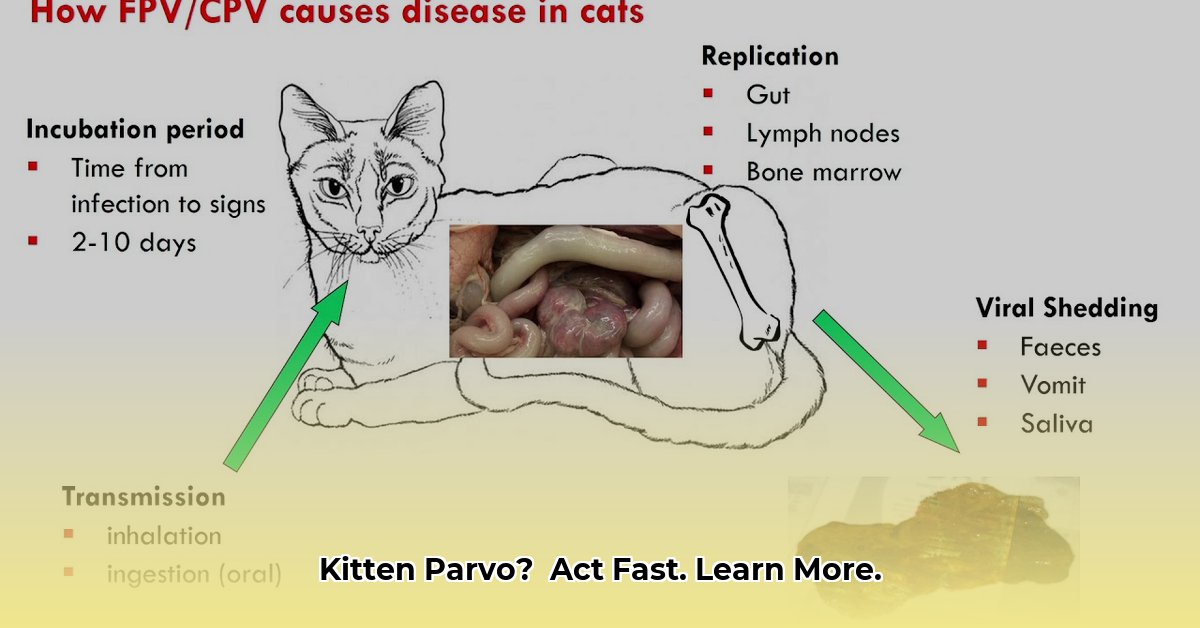What is Feline Parvo?
Feline parvovirus (FPV), also known as feline panleukopenia or feline distemper, is a highly contagious and potentially life-threatening viral disease that affects cats. It’s especially dangerous for kittens and unvaccinated cats. FPV attacks rapidly dividing cells in the body, particularly those in the bone marrow, intestines, and the developing fetus. This can lead to a weakened immune system, severe digestive issues, and other complications. While it shares a name with canine parvovirus, FPV is a distinct virus and does not affect dogs. Similarly, canine parvo generally does not affect cats, although some newer canine strains are suspected of having the potential for cross-species infection. More research is needed to fully understand this potential risk.
How is FPV Transmitted?
FPV is incredibly resilient and can persist in the environment for months, possibly even years. It spreads primarily through direct contact with infected cats and their bodily fluids (feces, urine, saliva, nasal discharge). Indirect transmission also occurs via contaminated objects like food and water bowls, bedding, litter boxes, and even clothing or shoes. Fleas can also mechanically transmit the virus, though this is less common. Vertical transmission, from a pregnant cat to her kittens in utero, can result in severe developmental issues or stillbirths.
Recognizing the Signs
Symptoms of FPV can vary, and some cats may even be asymptomatic carriers. However, common signs include:
- Lethargy: Lack of energy, decreased playfulness, and excessive sleeping.
- Loss of Appetite: Refusal to eat or drink, even favorite treats.
- Fever: Elevated body temperature. Paradoxically, the body temperature may later drop below normal (hypothermia) in severe cases.
- Vomiting: Frequent and often forceful, sometimes containing bile or blood.
- Diarrhea: Watery, often foul-smelling, and potentially bloody stools.
- Dehydration: Dry gums, sunken eyes, loss of skin elasticity.
- Weight Loss: Rapid and noticeable decrease in body weight.
- Other Possible Signs: Difficulty walking, nasal discharge, sneezing, frothing at the mouth.
If you observe any of these symptoms, especially in combination, immediate veterinary attention is crucial. Early intervention significantly improves the chances of survival.
Diagnosing FPV
Veterinarians diagnose FPV based on a combination of factors:
- Physical examination: Assessing for symptoms like fever, dehydration, and abdominal pain.
- Medical history: Considering potential exposure to infected cats or environments.
- Blood tests (CBC): A complete blood count often reveals pancytopenia (a decrease in all blood cell types), particularly a low white blood cell count.
- Fecal ELISA test: This test detects viral proteins in the stool and provides relatively quick results.
- PCR test: A more sensitive test that detects viral DNA, useful for confirming ambiguous cases or for early detection.
Treatment Options
There’s no specific antiviral medication that directly eliminates FPV. Treatment focuses on supporting the cat’s immune system and managing symptoms. This typically involves:
- Hospitalization: Especially critical for kittens and severely ill cats to provide intensive care.
- Intravenous (IV) fluids: To combat dehydration and restore electrolyte balance.
- Nutritional support: Tube feeding or offering highly digestible foods if the cat is not eating.
- Antibiotics: To prevent or treat secondary bacterial infections, which are a significant risk due to the weakened immune system.
- Antiemetics: Medications to control vomiting and nausea.
- Other supportive care: Pain management, thermal regulation, and careful monitoring.
- Emerging Therapies: Research is exploring new antiviral medications and immunomodulatory therapies, offering potential future advancements in FPV treatment.
Preventing FPV
Vaccination is the most effective way to protect your cat from FPV. Kittens typically begin their vaccination series at 6-8 weeks of age, with boosters every few weeks until around 16 weeks old. Adult cats require regular boosters, typically annually or every few years, as recommended by your veterinarian.
Disinfection Protocol
Thorough disinfection is crucial to eliminate FPV from the environment. Follow these steps:
- Clean First: Remove all organic matter (feces, vomit, etc.) with soap and water.
- Disinfect: Use a disinfectant effective against parvovirus, such as a diluted bleach solution (1 part bleach to 32 parts water). Always follow the manufacturer’s instructions.
- Contact Time: Allow the disinfectant to remain on surfaces for the recommended contact time (usually 10 minutes for bleach).
- Rinse: Thoroughly rinse disinfected surfaces with clean water to remove any residue.
- Laundry: Wash all bedding, towels, and other washable items in hot water with bleach.
Long-Term Effects and Prognosis
Most cats that receive prompt and appropriate treatment recover fully from FPV. However, some may experience lingering digestive issues or a weakened immune system. Kittens infected in utero or shortly after birth may suffer from cerebellar hypoplasia, a neurological condition affecting coordination. The prognosis varies depending on the cat’s age, overall health, and the severity of the infection. Your veterinarian can provide a more accurate assessment based on your cat’s individual situation.
Emotional Support and Resources
Facing an FPV diagnosis can be stressful. Remember, you’re not alone. Lean on your veterinarian for guidance and support. Don’t hesitate to reach out to friends, family, or online support groups for emotional support. The American Veterinary Medical Association (AVMA) provides reliable information on FPV and other feline health topics.
Ongoing Research
Researchers continue to study FPV, exploring areas like viral genetics, immune responses, and long-term effects. This ongoing research is essential for improving diagnostic and treatment strategies and ultimately protecting more cats from this devastating disease. It’s important to remember that scientific understanding is constantly evolving, so consult with your veterinarian for the most up-to-date information.
By understanding FPV, its transmission, symptoms, and treatment, you can be better prepared to protect and care for your feline companion. While FPV is a serious concern, with vigilance, preventative measures, and prompt veterinary care, many cats recover and live long, healthy lives.
- Divided Food Containers Are Meal Preps Secret Weapon - February 7, 2026
- Food Kits for Adults Offer Fun DIY Cooking Adventures - February 6, 2026
- Food Making Kits Bring Easy, Fun Homemade Dishes to Your Kitchen - February 5, 2026










